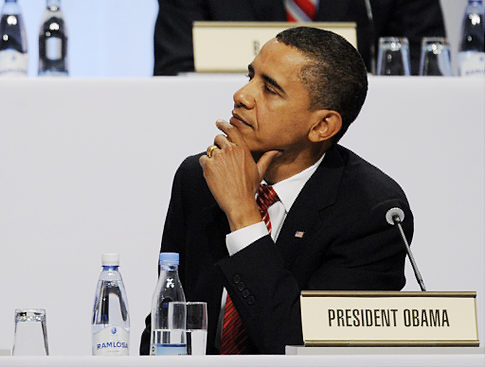Obama offers China climate change olive branch
 Copenhagen, Dec 18 : US President Barack Obama sought to win over China as world leaders struggled Friday to salvage a global deal aimed at preventing devastating changes to the planet's climate.
Copenhagen, Dec 18 : US President Barack Obama sought to win over China as world leaders struggled Friday to salvage a global deal aimed at preventing devastating changes to the planet's climate.
Addressing some 120 heads of state and government convened for a final day of talks in Copenhagen, Obama said efforts to keep greenhouse-gas emissions in check should be based on honest reporting, but that any monitoring need not necessarily infringe on a country's sovereignty.
The speech sent a clear message to China, which has long maintained that its "voluntary" emission targets should not be subjected to enforced international supervision.
"We must have a mechanism to review whether we are keeping our commitments, and to exchange this information in a transparent manner," Obama said.
But "these measures need not be intrusive, or infringe upon sovereignty," the president added.
His comments came just moments after Chinese premier Wen Jiabao said his country was willing to "actively engage in international exchanges and cooperation" on national emission targets.
Officials in Copenhagen say agreement between China and the US - which together account for more than 40 per cent of world emissions - is essential to a deal aimed at keeping global warming in check.
Friday's round of talks was preceded by a mini-summit attended by about 20 selected leaders, among them Obama, French President Nicolas Sarkozy, British Prime Minister Gordon Brown, Brazilian President Luiz Lula da Silva, Russian President Dmitry Medvedev and Indian Prime Minister Manmohan Singh. China was represented by deputy Foreign Minister He Yafei.
That meeting saw leaders fail to agree on a political declaration.
"One of the main problems is that China is still reluctant to accept the idea of external control (on its greenhouse-gas emissions). China is not the only problem: India, too, has been raising concerns," Sarkozy said.
While a legally-binding agreement is no longer on the cards, it is hoped that leaders will agree on a series of key issues under a so-called "umbrella declaration".
The overarching aim of the Copenhagen summit is to keep average global temperatures from rising by more than 2 degrees Centigrade against pre-industrial levels, as advised by scientists.
This should be done through massive emission cuts by rich nations - in the region of 25-40 per cent by 2020 and as much as 80-95 per cent by 2050, against either 1990 or 2005 levels.
Another key issue is funding. Rich nations are believed to have endorsed calls to provide 30 billion dollars over three years in "fast-start" aid to poor nations, and a further 100 billion dollars per year by 2020.
In his speech, Obama reminded his colleagues that climate change was no longer "fiction" but "science", and urged them not to waste any more time in fruitless talks.
"The question before us is no longer the nature of the challenge - the question is our capacity to meet it," Obama said.
South African President Jacob Zuma said that while developing nations had hoped for "a complete legally-binding agreement", they accepted that at least some "progress" had been achieved in
Copenhagen.
Meanwhile, Brazil's Lula - hailed by environmentalists for being among the first leaders of a major developing country to accept significant emission cuts - surprised his audience by offering to contribute money for poor nations in a bid to achieve a deal. (DPA)